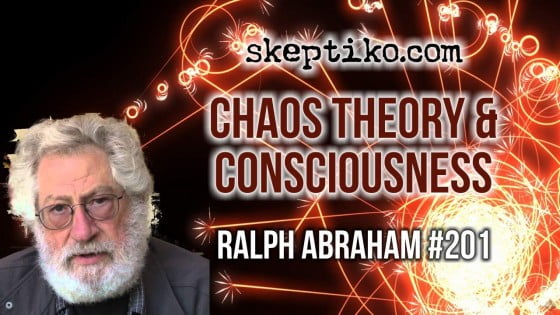Dianne Collins, Quantum Think system... quantum physics... personal empowerment... metaphor stretching? Click here for Dianne Collins'...
Tag: quantum physics
Dean Radin, Quantum Consciousness Experiments |545|
Dr. Dean Radin has shattered the quantum consciousness link question, but where will it lead? Subscribe: Click here for Dean...
Dr. Doug Matzke, Quantum Computers and Extended Consciousness |487|
Dr. Doug Matzke, has a PhD in quantum computing... he gets the physics to extended consciousness link. Click here for Dr, Doug Matzke's...
Rick DeLano’s Terrific Quantum Science Film Tainted by Catholic Nonsense |454|
Rick DeLano's movie, The End of Quantum Reality makes a strong case against scientific materialism, but then there's the Catholic...
This attorney takes extraterrestrial contact seriously. Now he’s helping remove the stigma for other “experiencers” |260|
Successful Miami attorney Rey Hernandez's UFO experience drove him to support others. Join Skeptiko host Alex Tsakiris for an interview with...
201. Chaos Theory Pioneer Ralph Abraham On a New Model of Consciousness
Interview with chaos theory pioneer Dr. Ralph Abraham offers new insights into how a chaotic model of consciousness might work. Join Skeptiko...
160. Dr. Christof Koch on Human Consciousness and Near-Death Experience Research
Interview with Cal Tech professor and author of the upcoming, Consciousness: Confessions of a Romantic Reductionist, Dr. Christof Koch. Join Skeptiko host Alex Tsakiris for an interview with Dr. Christof Koch, author of, Consciousness: Confessions of a Romantic Reductionist. During the interview Dr. Koch discusses the limits of near-death experience research for understanding consciousness: Dr. Koch: …once again it’s all about the details. The only way you can do such an experiment would be to have a near-death experience while your brain waves are being recorded, while you’re in a brain scanner. Because otherwise, how do I know? Otherwise, the guy wakes up an hour later, right, and then you ask what happened to his brain an hour before. Of course, an hour before he wasn’t in the brain scanner. So the only way to do the experiment is while you’re having this near-death experience. Alex Tsakiris: Great. And that makes it impossible to do the experiment. We’re back to ground zero. But hold on. I don’t think that’s the case. You referenced the GLOC experiments with the pilots. Well, by deduction you’re incorporating in human experience. You’re saying that of course, which is obvious, people can say what happened to them. The other thing about it is that they have this continuity of experience, right? They say, “Oh, I was awake and then I started blacking out and then this happened and then I woke up.” They have a continuous experience. Now you can say they recreated that continuous experience after they woke up but the burden is really on you, especially when it’s consistently reported as a continuous experience. Why would we assume that it’s not continuous? That’s the way it’s being reported. Dr. Koch: When I go to bed I suddenly wake up inside and I fly. I just did this tonight. I have no experience of the intervening two hours, right? So suddenly I’m flying. Well, wonderful. So now what? So now you’re going to say it’s not up to you to find out through which space that I flew? No. I have this experience every night. My brain gives rise to all sorts of experiences. Of course I realize them. I don’t deny them for one second. But they’re caused by specific brain activity. Christof Koch's Website Bernardo Kastrup's Response Play It: Download MP3 (47:00 min.) Read It: Today we welcome Dr. Christof Koch to Skeptiko. Dr. Koch is recognized as one of the world’s leading consciousness researchers. He has a very distinguished academic career and was a Caltech professor before becoming the chief scientific officer at the Allen Institute for Brain Science. Christof, thanks so much for joining me today on Skeptiko. Dr. Koch: My pleasure, Alex.
...133. Dr. Stuart Hameroff On Quantum Consciousness and Moving Singularity Goal Posts
Human consciousness researcher Dr. Stuart Hameroff describes how discoveries are revealing more brain complexity than artificial intelligence (AI) experts suspected. Join Skeptiko host Alex Tsakiris for an interview with Dr. Stuart Hameroff. Dr. Hameroff is Professor Emeritus in the Departments of Anesthesiology and Psychology at the University of Arizona, where he also serves as the Director of the Center for Consciousness Studies. During the interview Mr. Tsakiris and Dr. Hameroff discuss whether DMT-based psychedelic experiences provide evidence that our consciousness exists outside of the brain: Alex Tsakiris: Your understanding of the quantum mechanics of the neuron really stirs up a lot of angst among the AI singularity crowd. Tell us a little bit about that controversy. Dr. Stuart Hameroff: To look at our brain as 100 billion simple switches -- to look at a neuron as a switch or gate -- it's an insult to neurons. It's just not that simple. If you study biology you realize this. But a lot of biologists get bogged down with the details and lose the big picture. They see the information processing in the cell as a minestrone soup of chemicals when they're ignoring the solid state system in the microtubules. The bit with the AI and the singularity, there's actually a couple of points of friction here. As I said, I spent 20 years studying microtubule information processing. The AI approach would be, roughly speaking, that a neuron fires or it doesn't. It's roughly comparable to a bit, 1 or 0. It's more complicated than that but roughly speaking. I was saying no, each neuron has roughly 10-8 tubulins switching at roughly 10-7 per second, getting 10-15 operations per second per neuron. If you multiply that by the number of neurons you get 10 to the 26th operations per second per brain. AI is looking at neurons firing or not firing, 1,000 per second, 1,000 synapses. Something like the 10 to the 15th operations per second per brain... and that's without even bringing in the quantum business. So that alone was pushing the goalpost way, way downstream into the future. Dr. Stuart Hameroff's website Play it: Download MP3 (34:00 min.) Read it: Today we welcome Dr. Stuart Hameroff to Skeptiko. Dr. Hameroff is Professor Emeritus in the Departments of Anesthesiology and Psychology at the University of Arizona, where he also serves as the Director of the Center for Consciousness Studies. Dr. Hameroff, thank you so much for joining me today on Skeptiko. Dr. Stuart Hameroff: You're welcome, Alex. It's nice to be here.
...9. The Universe Isn’t Pointless, Dr. Jean Burns
Guest: Dr. Jean Burns discusses her experiences on the front lines of the "psi wars", and the relationship between physics and consciousness...












